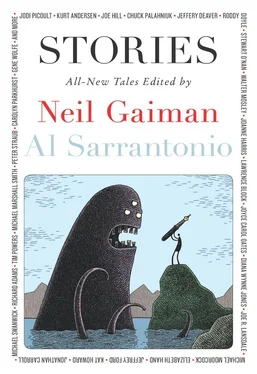Neil Gaiman - Stories - All-New Tales
Здесь есть возможность читать онлайн «Neil Gaiman - Stories - All-New Tales» весь текст электронной книги совершенно бесплатно (целиком полную версию без сокращений). В некоторых случаях можно слушать аудио, скачать через торрент в формате fb2 и присутствует краткое содержание. Жанр: Фантастика и фэнтези, на английском языке. Описание произведения, (предисловие) а так же отзывы посетителей доступны на портале библиотеки ЛибКат.
- Название:Stories: All-New Tales
- Автор:
- Жанр:
- Год:неизвестен
- ISBN:нет данных
- Рейтинг книги:3 / 5. Голосов: 1
-
Избранное:Добавить в избранное
- Отзывы:
-
Ваша оценка:
- 60
- 1
- 2
- 3
- 4
- 5
Stories: All-New Tales: краткое содержание, описание и аннотация
Предлагаем к чтению аннотацию, описание, краткое содержание или предисловие (зависит от того, что написал сам автор книги «Stories: All-New Tales»). Если вы не нашли необходимую информацию о книге — напишите в комментариях, мы постараемся отыскать её.
Stories: All-New Tales — читать онлайн бесплатно полную книгу (весь текст) целиком
Ниже представлен текст книги, разбитый по страницам. Система сохранения места последней прочитанной страницы, позволяет с удобством читать онлайн бесплатно книгу «Stories: All-New Tales», без необходимости каждый раз заново искать на чём Вы остановились. Поставьте закладку, и сможете в любой момент перейти на страницу, на которой закончили чтение.
Интервал:
Закладка:
Such meager life, yet such life struggles to save itself! — so the demon brother would recall, in contempt.
OF COURSE WE LOVE Edgar and Edward equally. They are both our sons.
This declaration the demon brother knew to be a lie. Yet was angered by the thought that, when the parents uttered the lie, as they did frequently, those who heard it might believe. And the smaller brother, the sickly brother, with his caved-in chest, crooked spine, wheezy asthmatic breath, yearning teary eyes and sweet smile wished to believe. To rebuke him, the demon brother had a way of turning on him when they were alone, for no (evident) reason pushing him, shoving him, wrestling him to the floor, as the smaller brother drew breath to protest straddling him with his knees, gripping the breakable rib cage like a vise, thump-thump-thumping the little freak’s head against the floor, the moist hard palm of a hand clamped over the little freak’s mouth to prevent him from crying for help Mama mama mama faint as a dying lamb’s bleating and so unheard by the mother in another part of the house downstairs in her bliss of ignorance not hearing the thump-thump-thump of the smaller brother’s head against the carpeted floor of the boys’ room until at last the smaller brother goes limp, ceases to struggle, ceases to struggle for breath, his pinched little face has turned blue, and the demon brother relents, releases him panting and triumphant.
Could’ve killed you, freak. And I will, if you tell .
For why were there two and not one? As in the womb, the demon brother felt the injustice, and the illogic.
School! So many years. Here the demon brother, who was called Eddie, was first in all things. As the smaller brother, who was called Edward, lagged behind. Immediately in elementary school the brothers were not perceived to be twins but only just brothers, or relatives sharing a last name.
Eddie Waldman. Edward Waldman. But you never saw them together .
At school, Eddie was one of the popular boys. Adored by girls, emulated and admired by boys. He was a big boy. A husky boy. He was a natural leader, an athlete. Waved his hand, and the teachers called upon him. His grades were never less than a B. His smile was a dimpled smile, sly-sincere. He had a way of looking you frankly in the eye. By the age of ten Eddie had learned to shake hands with adults and to introduce himself Hi! I’m Eddie provoking smiles of admiration What a bright precocious child! and, to demon brother’s parents How proud you must be of your son as if in fact there was but one son, and not two. In sixth grade, Eddie ran for president of his class and was elected by a wide margin.
I am your brother, remember me!
You are nothing of mine. Go away!
But I am in you. Where can I go?
Already in elementary school the smaller brother Edward had dropped behind his twin. The problem wasn’t his schoolwork-for Edward was a bright, intelligent, inquisitive boy-his grades were often As, when he was able to complete his work-but his health. So frequently absent from his fifth-grade classes, he’d had to repeat the year. His lungs were weak, he caught respiratory infections easily. His heart was weak, in eighth grade he was hospitalized for weeks following surgery to repair the faulty heart valve. In tenth grade he suffered a “freak accident”-observed only by his brother Eddie, in their home-falling down a flight of stairs, breaking his right leg and kneecap and his right arm and several ribs and injuring his spine and thereafter he had to hobble about stricken with shyness, wincing in pain, on crutches. His teachers were aware of him, the younger Waldman boy. His teachers regarded him with sympathy, pity. In high school, his grades became ever more erratic: sometimes As but more often Cs, Ds, Incompletes. The smaller brother seemed to have difficulty concentrating in his classes, he fidgeted with pain, or stared open eyed in a haze of painkillers, scarcely aware of his surroundings. When he was fully awake, he had a habit of hunching over his notebooks, which were unusually large, spiral notebooks with unlined pages, like sketchbooks, and in these notebooks he appeared to be constantly drawing, or writing; he frowned and bit his lower lip, lost in concentration, ignoring the teacher and the rest of the class Slipping into infinity, a pleat in time and a twist of the pen and there’s freedom ! The pen had to be a black felt-tip with a fine point. The notebooks had to have marbled black-and-white covers. The teacher had to call upon “Edward” several times to get the boy’s full attention and in his eyes then, a quick flaring up, like a match lighted, shyness supplanted by something like resentment, fury. Leave me alone why can’t you, I am not one of you.
By the time the brothers were eighteen, Eddie was a senior bound for college, president of his class and captain of the football team and in the school yearbook “most likely to succeed” and Edward was trailing behind by a year, with poor grades. He’d begun to arrive at school with a wheelchair, brought by his mother, now in the throes of spinal pain from a slipped disk, and in this wheelchair he was positioned at the front, right-hand corner of his classes, near the teacher’s desk, a broken, freaky figure with a small pinched boy’s face, waxy skin and slack lips, drowsy from painkillers, or absorbed in his spiral notebooks in which he only pretended to take notes while in fact drawing bizarre figures-geometrical, humanoid-that seemed to spring from the end of his black felt-tip pen.
In the spring of his junior year, stricken with bronchitis, Edward didn’t complete his courses and never returned to school: his formal education had ended. In that year, Eddie Waldman was recruited by a dozen universities offering sports scholarships and, shrewdly, he chose the most academically prestigious of the universities, for his goal beyond the university was law school.
Resembling each other as a shadow can be said to resemble its object. Edward was the shadow.
By this time the brothers no longer shared a room. The brothers never longer shared-even! — the old, cruel childish custom of the demon brother’s wish to harm his smaller twin; the demon brother’s wish to suck all the oxygen out of the air, to swallow up his smaller twin entirely. Why be this other here-this thing! Why this, when there is me!
Here was the strange thing: the smaller brother was the one to miss the bond between them. For he had no other so deeply imprinted in his soul as his brother, no bond so fierce and intimate. I am in you, I am your brother, you must love me .
But Eddie laughed, backing away. Shook hands with his sickly brother for whom he felt only a mild repugnance, the mildest pang of guilt, and he said good-bye to his parents, allowed himself to be embraced and kissed and went away, smiling in anticipation of his life he went away with no plan to return to his hometown and to his boyhood house except for expediency’s sake as a temporary visitor who would be, within hours of his return, restless, bored, eager to escape again to his “real” life elsewhere.
NOW IN THEIR TWENTIES the brothers rarely saw each other. Never spoke on the phone.
Eddie Waldman graduated from law school. Edward Waldman continued to live at home.
Eddie excelled, recruited by a prominent New York City law firm. Edward suffered a succession of “health crises.”
The father divorced the mother, abruptly and mysteriously it seemed for the father, too, had a “real” life elsewhere.
Eddie entered politics, under the tutelage of a prominent conservative politician. Edward, suffering spinal pain, spent most days in a wheelchair. Inside his head calculating numbers, imagining equations in which the numerical, the symbolic, and the organic were combined, inventing music, rapidly filling large sheets of construction paper with bizarre yet meticulously detailed geometrical and humanoid figures in settings resembling those of the surrealist painter de Chirico and the visionary artist M. C. Escher. Our lives are Möbius strips, misery and wonder simultaneously. Our destinies are infinite, and infinitely recurring .
Читать дальшеИнтервал:
Закладка:
Похожие книги на «Stories: All-New Tales»
Представляем Вашему вниманию похожие книги на «Stories: All-New Tales» списком для выбора. Мы отобрали схожую по названию и смыслу литературу в надежде предоставить читателям больше вариантов отыскать новые, интересные, ещё непрочитанные произведения.
Обсуждение, отзывы о книге «Stories: All-New Tales» и просто собственные мнения читателей. Оставьте ваши комментарии, напишите, что Вы думаете о произведении, его смысле или главных героях. Укажите что конкретно понравилось, а что нет, и почему Вы так считаете.









